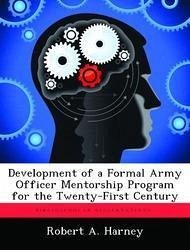This study addresses the role of formal mentoring processes in the U.S. Army. Specifically, this study examines which formal mentoring model should the Army adopt and implement as part of its overall officer development process. It also investigates the roles of senior leaders, mentors, protégés in the Army mentorship and leader development process as reflected by doctrine, polices, and formal applications. This study concluded that Army ranks above the civilian sector but below some government agencies such as the Air Force, Coast Guard, and Department of Energy in developing and implementing effective programs. This study also concluded that Army has already adopted as part of its overall officer professional development programs formal mentoring models comprising either one-on-one or mentoring circles (one mentor with many protégés) processes or relationships. These programs, however, have shortcomings in the areas of structure; the pairing of mentors with protégés; cadet, candidate, and junior officer mentoring; and awareness training and feedback mechanisms. Army doctrine (to include the Army definition of mentorship), previously conducted studies, retired and active duty senior leader comments, current Army formal mentoring processes, and this study's extensive research indicate these formal models and associated mentoring can reap invaluable benefits in the areas affecting captain retention, readiness, cadet and officer candidate assimilation, minority representation in combat arms specialties, diversity awareness, and perceptions of fair and equal treatment--if properly executed.
Hinweis: Dieser Artikel kann nur an eine deutsche Lieferadresse ausgeliefert werden.
Hinweis: Dieser Artikel kann nur an eine deutsche Lieferadresse ausgeliefert werden.








